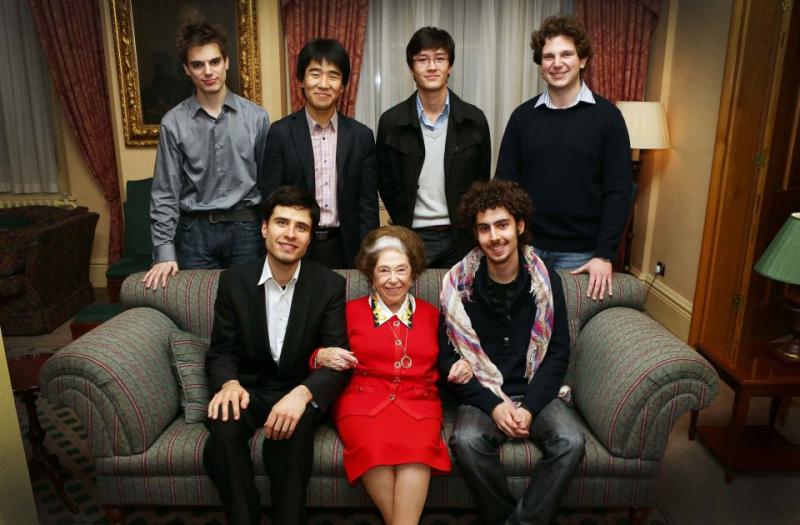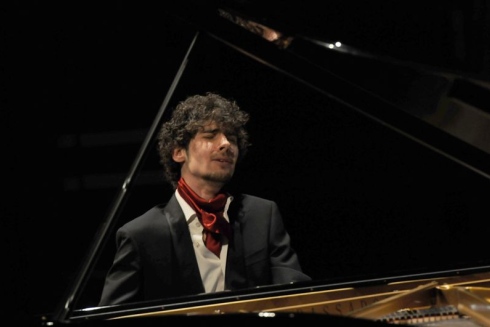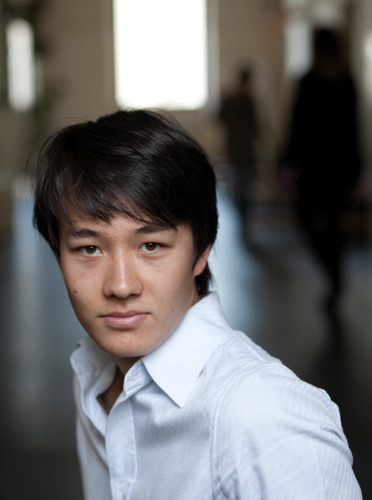The Leeds International Piano Competition finals, Leeds Town Hall | reviews, news & interviews
The Leeds International Piano Competition finals, Leeds Town Hall
The Leeds International Piano Competition finals, Leeds Town Hall
'The greatest piano competition in the world!' according to its founder Dame Fanny Waterman

Fans of the Leeds International Piano Competition argue that this triennial event, now in its 49th year, has done more to raise the city’s profile than any other local institution. Supporters of Leeds United would doubtless disagree, but Dame Fanny Waterman’s long-running contest has grown into an influential, internationally renowned affair. Dame Janet Baker awards the prizes. Lang Lang is now the competition’s Global Ambassador along with Honorary Ambassador Aung San Suu Kyi.
Perusing the names of winners and finalists in previous years throws up an impressive list; Murray Perahia, Andras Schiff, Mitsuko Uchida and Radu Lupu all made their names here in the Seventies. More recently, Lars Vogt, Artur Pizarro and Ashley Wass are among the more recognisable figures. Nowadays the entrants are drawn from a far wider catchment, and a flick through the programme book reveals the emerging dominance of musicians from China and the Far East; only two are British. Disappointingly, all of the finalists were male.
Whatever one’s gripes about the outcome, there’s no disputing that this is a hugely impressive, world-class event
It’s in the nature of competitions that many winners will disappear without trace, or that audiences will mutter that the wrong candidates were chosen. Last night’s prize-giving was accompanied by much underhand groaning as favoured players were ranked by Waterman’s illustrious jury in fifth and sixth place. Those of us who correctly placed the top three quietly punched our fists into the air and nodded with satisfaction as the results were announced. Whatever one’s gripes about the outcome, there’s no disputing that this is a hugely impressive, world-class event, where 68 entrants are whittled down over two weeks to a shortlist of six.
In a final spread over two nights, finalists each played a concerto accompanied by Sir Mark Elder’s Hallé. Excellent though they are, it seems a missed opportunity not to use Leeds’s own Orchestra of Opera North. Concerts in Leeds Town Hall can be bronchial, acoustically problematic events, especially in the depths of winter. There’s a rather different ambience to the LIPC finals – the audience is more ethnically, socially and chronologically diverse, and there’s barely any coughing. The sound feels less diffuse. Perhaps this is a welcome side effect of a well-heeled capacity crowd, their clothes soaking up any excess reverberation.

 Swiss pianist Louis Schwizgebel’s (pictured left) Friday evening account of Beethoven’s Concerto no 4 won him second place; a performance of staggering refinement and sensitivity. In a piece containing so much chamber music, Schwizgebel’s tangible rapport with an enthralled Elder was a delight.
Swiss pianist Louis Schwizgebel’s (pictured left) Friday evening account of Beethoven’s Concerto no 4 won him second place; a performance of staggering refinement and sensitivity. In a piece containing so much chamber music, Schwizgebel’s tangible rapport with an enthralled Elder was a delight.
Schwizgebel was followed by an incisive, edge-of-seat assault on Prokofiev’s satanic Concerto no 2. The young Chinese player Jiayan Sun won a deserved third prize for a performance which rightly teetered on the edge of hysteria, though never losing sight of the romantic heart beating away beneath all the violence. Sun’s case was bolstered by muscular brass and percussion playing from the Hallé.
Andrejs Osokins’s Prokofiev Concerto no 3 was a fantastic opener to the second evening. We heard some magical things – the toccata passage work in the opening movement handled so deftly that Osokins’s fingers became an improbable blur, and plenty of bittersweet pain in the build up to the concerto’s closing minutes. His was a hugely engaging platform presence, though, and he possesses an awesome left hand technique, bass lines pounding out with terrifying immediacy.
Alas, there were probably too many instances of slight imprecision and dodgy coordination to enable the jury to rank him higher. Andrew Tyson’s Rachmaninov Concerto no 3 just failed to ignite, despite many incidental pleasures. Tyson is undoubtedly a wonderfully, poised, fluent player, but he seemed just a little over polite and unruffled. The sort of musician you’d love to hear playing Mozart or Schubert, but temperamentally unsuited to depressive Slavic repertoire. His fifth placing clearly disappointed many audience members, but it was good to see him receiving an award voted for by the orchestral players. Federico Colli will give his gala recital this afternoon in the Great Hall of Leeds University. He and the other finalists will be offered a range of engagements in the coming months. The rest of us have to wait until 2015 to reflect on how the six competitors have fared, and to argue about who is the best of the new lot.
- BBC Four broadcasts a six-part series about the 2012 Leed Piano Competition from Friday 21 September - BBC Radio 3 relay of last night's final is available on BBC iPlayer
Add comment
The future of Arts Journalism
You can stop theartsdesk.com closing!
We urgently need financing to survive. Our fundraising drive has thus far raised £49,000 but we need to reach £100,000 or we will be forced to close. Please contribute here: https://gofund.me/c3f6033d
And if you can forward this information to anyone who might assist, we’d be grateful.

Subscribe to theartsdesk.com
Thank you for continuing to read our work on theartsdesk.com. For unlimited access to every article in its entirety, including our archive of more than 15,000 pieces, we're asking for £5 per month or £40 per year. We feel it's a very good deal, and hope you do too.
To take a subscription now simply click here.
And if you're looking for that extra gift for a friend or family member, why not treat them to a theartsdesk.com gift subscription?
more Classical music
 Kempf, Brno Philharmonic, Davies, Bridgewater Hall, Manchester review - European tradition meets American jazz
Bouncing Czechs enjoy their Gershwin and Brubeck alongside Janáček and Dvořák
Kempf, Brno Philharmonic, Davies, Bridgewater Hall, Manchester review - European tradition meets American jazz
Bouncing Czechs enjoy their Gershwin and Brubeck alongside Janáček and Dvořák
 Solomon, OAE, Butt, QEH review - daft Biblical whitewashing with great choruses
Even a top soprano and mezzo can’t make this Handel paean wholly convincing
Solomon, OAE, Butt, QEH review - daft Biblical whitewashing with great choruses
Even a top soprano and mezzo can’t make this Handel paean wholly convincing
 Two-Piano Gala, Kings Place review - shining constellations
London Piano Festival curators and illustrious friends entertain and enlighten
Two-Piano Gala, Kings Place review - shining constellations
London Piano Festival curators and illustrious friends entertain and enlighten
 Echo Vocal Ensemble, Latto, Union Chapel review - eclectic choral programme garlanded with dance
Beautiful singing at the heart of an imaginative and stylistically varied concert
Echo Vocal Ensemble, Latto, Union Chapel review - eclectic choral programme garlanded with dance
Beautiful singing at the heart of an imaginative and stylistically varied concert
 Scott, Irish Baroque Orchestra, Whelan, RIAM, Dublin review - towards a Mozart masterpiece
Characteristic joy and enlightenment from this team, but a valveless horn brings problems
Scott, Irish Baroque Orchestra, Whelan, RIAM, Dublin review - towards a Mozart masterpiece
Characteristic joy and enlightenment from this team, but a valveless horn brings problems
 Classical CDs: Voice flutes, flugelhorns and froth
Baroque sonatas, English orchestral music and an emotionally-charged vocal recital
Classical CDs: Voice flutes, flugelhorns and froth
Baroque sonatas, English orchestral music and an emotionally-charged vocal recital
 Kanneh-Mason, Britten Sinfonia, Shave, Milton Court - a grin and a big beaming smile
A pair of striking contemporary pieces alongside two old favourites
Kanneh-Mason, Britten Sinfonia, Shave, Milton Court - a grin and a big beaming smile
A pair of striking contemporary pieces alongside two old favourites
 theartsdesk at the New Ross Piano Festival - Finghin Collins’ musical rainbow
From revelatory Bach played with astounding maturity by a 22 year old to four-hand jazz
theartsdesk at the New Ross Piano Festival - Finghin Collins’ musical rainbow
From revelatory Bach played with astounding maturity by a 22 year old to four-hand jazz
 First Person: Manchester Camerata's Head of Artistic Planning Clara Marshall Cawley on questioning the status quo
Five days of free events with all sorts of audiences around Manchester starts tomorrow
First Person: Manchester Camerata's Head of Artistic Planning Clara Marshall Cawley on questioning the status quo
Five days of free events with all sorts of audiences around Manchester starts tomorrow
 Goldscheider, Brother Tree Sound, Kings Place review - music of hope from a young composer
Unusual combination of horn, strings and electronics makes for some intriguing listening
Goldscheider, Brother Tree Sound, Kings Place review - music of hope from a young composer
Unusual combination of horn, strings and electronics makes for some intriguing listening

Comments
Louis Schwizgebel struck me
I am staggered that Andrew
I agree though I think he was
I enjoyed reading this
Not going to get into